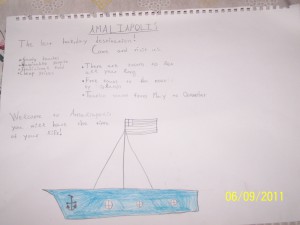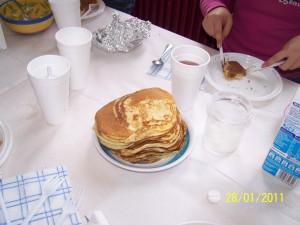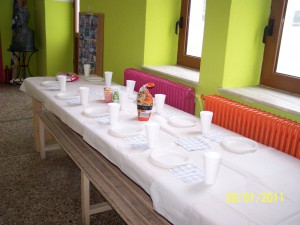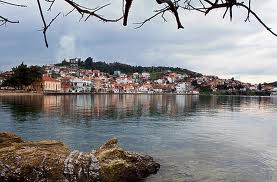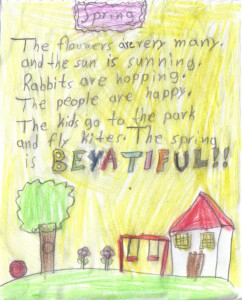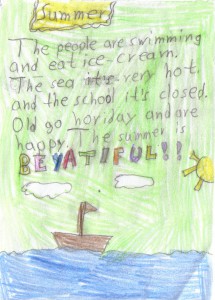Learners at the Primary School of Amaliapolis have created posters that advertise their village! Here is a sample of their work!
Αρχεία για ‘Αγγλικά’
OUR VILLAGE, AMALIAPOLIS
Since the beginning of this school year, learners in the Primary School of Amaliapolis have been exchanging projects with various schools in the USA. After exchanging presentations of our schools, it was time to present the areas we live in! Learners in Amaliapolis took their own pictures of their village and added some other, wonderful pictures they found on the internet. They wrote about their village, and here is their presentation:
Some of the pictures used in the presentation were retrieved from the following pages:
Picture
Picture
Picture
Picture
Picture
Picture
Picture
Picture
Picture
Picture
Picture
Picture
Picture
English breakfast at school! – Αγγλικό πρωινό στο σχολείο!
Our 5th grade English coursebook introduces pancakes as part of the American breakfast (Unit 4, Lesson 2, p. 54), but they are also included in the English breakfast. After a discussion with the 5th grade learners at the Primary School of Amaliapolis regarding what an English breakfast includes, its nutritional value and its differences from the Greek breakfast, learners were invited to try the English breakfast at school!!! They had the opportunity to drink tea, have milk with cereals and enjoy delicious pancakes! As they have said, the English breakfast is quite enjoyable and the best part of it was the pancakes!!!
Το βιβλίο των Αγγλικών της Ε’ Τάξης παρουσιάζει τις τηγανίτες (pancakes) ως μέρος του πρωινού γεύματος των Αμερικανών (Κεφάλαιο 4, Μάθημα 2, σελ. 54), αλλά συμπεριλαμβάνονται επίσης και στο Αγγλικό πρωινό. Μετά από συζήτηση με τους μαθητές για το τι συμπεριλαμβάνει ένα Αγγλικό πρωινό, τη διατροφική του αξία και τις διαφορές του από το Ελληνικό πρωινό, οι μαθητές είχαν την ευκαιρία να δοκιμάσουν το Αγγλικό πρωινό στο σχολείο! Το γεύμα περιλάμβανε τσάι, γάλα με δημητριακά και λαχταριστές τηγανίτες!!! Όπως δήλωσαν οι ίδιοι, το Αγγλικό πρωινό είναι αρκετά απολαυστικό και το καλύτερο μέρος του είναι οι τηγανίτες!!!
Pancakes (20 pieces)
by Chris and Tsetsi Logofetov
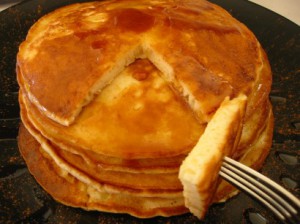
Solid Ingredients:
5 cups of flour
5 tablespoons of baking powder
5 tablespoons of sugar
2 vanillas
a little salt
Liquid ingredients:
5 eggs
5 tablespoons of olive oil
5 glasses of fresh milk
Procedure:
We mix all the solid ingredients in a bowl and we mix all the liquid ingredients in another bowl. We put the mixture of the liquid ingredients into the mixture of the solid ones and we mix. We put half a teaspoon of butter into a small, hot frying pan. When the butter melts, we put some of the dough in the frying pan. As soon as it starts steaming (you will see bubbbles), we turn it over with a spatula.
To see the recipe in Greek, click here.
Για να δείτε τη συνταγή στα ελληνικά, πατήστε εδώ.
ENGLISH AND GREEK CUSTOMS AND HABITS, by Xenia Xanthi (5th grade)
I live in Greece and I am 11 years old. In my country, on Christmas day, we have special sweets, such as ‘kourabiedes’ and ‘melomakarona’. We also have turkey. In the morning, we decorate the Christmas tree. In England, the people have a big Christmas tree in an amusement park and they have a lot of different presents under the tree.
At Easter, we dye the eggs red and we have a big celebration with meat. The English do not dye eggs, because it is only a Greek-Orthodox custom.
English people are more polite than the Greek people. They always have a big breakfast in the morning and then they have lunch at 4, or 5 o’clock. They never eat late at night. Also, they always say ‘thank you’ and ‘please’. Greek people like going out very much. They go to special places, like taverns, or ‘bouzoukia’ with Greek music and they dance all night long. Greeks are also very friendly.
In England, when it is someone’s birthday, his friends take him out and he doesn’t pay anything all day. In Greece, we usually have a birthday party at the birthday kid’s house, with a birthday cake and local food. The birthday kid’s parents pay for everything!
MY VILLAGE CUSTOMS, by Helen Xanthi (5th grade)
My name is Helen and I am 10 years old. In my village, Amaliapolis, at Christmas, we do not go to school, we decorate the Christmas tree and decorate my house. On New Year’s Day, we gather with my family in my grandmother’s house and we eat, open presents and play different games. During the Carnival, we wear costumes and masks and at night we go from one house to the other and people give us sweets. At Easter, we do not go to school again. On Easter day we eat lamb, play, listen to music and dance.
HABITS AND CUSTOMS IN BULGARIA, by Kika, Max, Tsetsi and Chris (5th grade)
In Bulgaria we have many habits and customs. At Christmas, we decorate the Christmas tree and we throw fireworks. At Easter, we dye eggs in many colours and we don’t eat lamb. On January 6th, on Theophany, we dance in the sea water for hours. We make a circle and we throw the cross in the water and the person who finds it wins!
ENGLISH AND GREEK CUSTOMS, by Dennis and Popi (5th grade)
In my country, on Christmas day, we have special sweets, such as ‘kourabiedes’ and ‘melomakarona’. We also have turkey. In England, the people have a big Christmas tree in their living room and they have a lot of different presents under the tree.
In England, when it is someone’s birthday, his friends take him out and he doesn’t pay anything all day. In Greece, we usually have a birthday party at home, with a birthday cake and local food. The birthday kid’s parents pay for everything!
GREEK CUSTOMS, by George Dimitriou (5th grade)
In Greece we have many habits and customs.
At Christmas we decorate the Christmas tree. My village is very beautiful during Christmas time. Santa Claus brings us presents.
On January 6th, Epiphany Day, the priest throws the cross in the sea water and the person who finds it wins.
At Easter we dye the eggs in many colours and we eat lamb and ‘kontosouvli’.
On March 25th we celebrate the liberation of Greeks from the Turks. Students and the army march all over the country. At school we sing songs and say poems.
Poems about the seasons, by Vassiliki Kouri
Our English 4th grade coursebook this year invites learners in writing poems about the seasons. When I first told them that they had a poem for homework, they were shocked, but they told me they would definitely try it! Here is what Vassiliki wrote about the seasons:
BEAUTIFUL poems, Vassiliki! Great pictures, too!
Poems about the seasons, by Nick Stekkas
Our English 4th grade coursebook this year invites learners in writing poems about the seasons. When I first told them that they had a poem for homework, they were shocked, but they told me they would definitely try it! Here is what Nick wrote about the seasons:
SUMMER
In the summer we swim
The school is closed
The kids smile
And they feel happy.
SPRING
In the spring we are happy
The spring is funny
The sun is shining
And the flowers are laughing.
AUTUMN
The school is open
The autumn is here
The kids do their homework
The autumn is here.
WINTER
The winter is great
The snow is here
In the winter we wear warm clothes
Because the snow is here.
Wonderful poems, Nick!!!
Poems about the seasons, by Chris Xanthis
Our English 4th grade coursebook this year invites learners in writing poems about the seasons. When I first told them that they had a poem for homework, they were shocked, but they told me they would definitely try it! Here is what Chris wrote about the seasons:
SUMMER
The summer is hot
The sun is in the sky
The people are swimming
And the boats are in the sea.
WINTER
The winter
The flowers are sleeping
It’s snowing
And it’s cold.
SPRING
The spring
it’s hot
Children are playing in the park
And it’s sunny.
AUTUMN
The autumn
It’s cold
It’s windy
And it’s raining.
Bravo, Chris!!!


